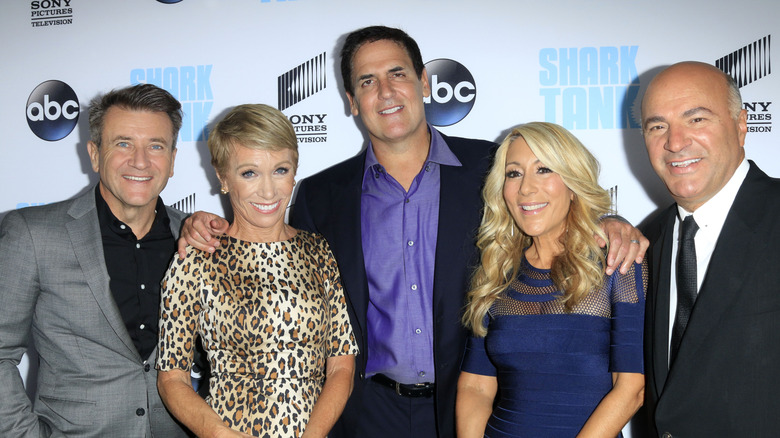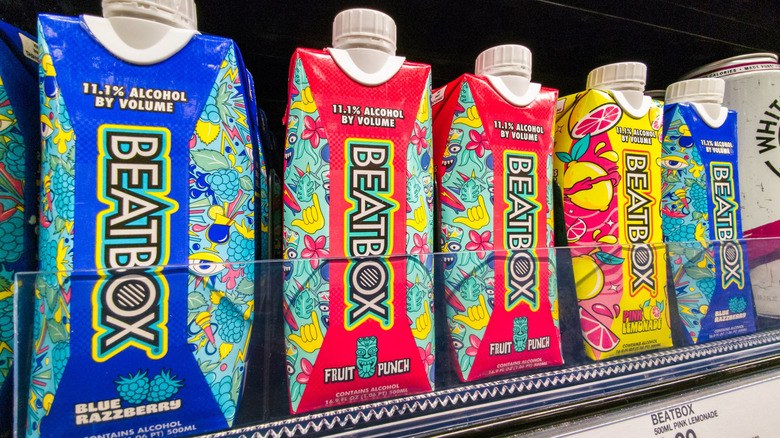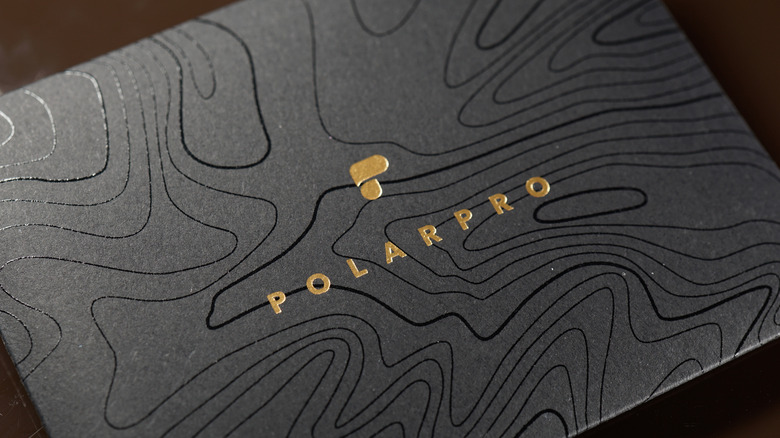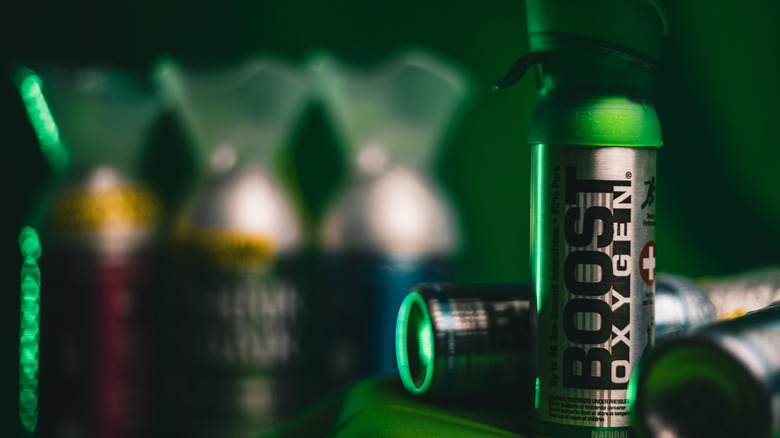The Biggest Deals Ever Made On Shark Tank
Going into its 17th season, Shark Tank remains one of the most popular business reality shows on television. Entrepreneurs walk into the tank with their business presentations, hoping to convince one of the "Sharks," a panel of five wealthy angel investors, to invest in their company or product. Since premiering in 2009, between 35,000 and 40,000 people apply each year to be on the show. Of those, just 1,000 make it to the next round, and only around 90 are selected to actually appear on the show each season.
Through 16 seasons 1,438 companies have pitched their ideas to sharks like Mark Cuban, Barbara Corcoran, and Kevin O'Leary. Of those pitches, more than 830, or 60%, made a deal on air. But not every deal survives the follow‑up process. Less than 400 deals have been finalized, about 28% of all pitches. Even so, the Sharks have invested more than $200 million of their own money, with the average deal coming in at close to $290,000.
While most investments fall in the six‑figure range, occasionally a deal comes along that inspires the sharks to commit as much as seven figures. Here are the biggest deals ever made on Shark Tank, each worth at least $1 million. For deals with the same amount, they are ranked by the amount of equity the entrepreneurs gave up to secure the investment. Interestingly, many of these did not go on to be among Shark Tank's most profitable products.
BeatBox Beverages – $1 Million Deal
In Season 6 of Shark Tank in 2014, three MBA students from the University of Texas entered the tank with a product that looked more like a party accessory than a traditional beverage. BeatBox Beverages offered boxed cocktails in bright, colorful five-liter packages designed to appeal to millennials. Their pitch was to create a party alternative to beer or wine and make drinking more fun, social, and convenient.
Three of the five Sharks made an offer, and the founders accepted Mark Cuban's investment of $1 million for 33% of the company. He liked the neon-colored fruit wines, which came in four flavors: Blue Razzberry Lemonade, Cranberry Limeade, Box A'Rita, and Texas Tea (available only in Texas). After the show, BeatBox Beverages exploded in popularity after shifting to single‑serve packs and moving distribution from wine and spirits networks to beer distributors. That change opened doors to convenience stores and mainstream retailers. It became a staple at music festivals, college parties, and retail stores across the country. Sales grew from $2 million in 2018 to a projected $250 million by 2025, according to industry analysts.
Now valued at more than $200 million, BeatBox has expanded nationwide to 107,000 retail locations, accounts for over 20% of the ready-to-drink (RTD) category growth, and continues to build momentum with celebrity investors like Shaquille O'Neal, as Forbes reported. BeatBox stands out as one of the rare Shark Tank companies that took a million-dollar investment and turned it into a massive success.
Breathometer – $1 Million Deal
In season 5 of Shark Tank in 2013, Charles Michael Yim pitched Breathometer, a portable breathalyzer that connected to smartphones through the audio jack. The idea was to give people an easy way to check their blood alcohol levels before driving. The app would provide their BAC and let them know when they would likely be sober. Users could also call a cab through the app if it were not safe to drive. Yim had raised over $138,000 on Indiegogo.
Yim impressed the sharks and became the first to get all five Sharks to invest. Mark Cuban, Kevin O'Leary, Daymond John, Lori Greiner, and Robert Herjavec committed $1 million for 30% equity. Initially, Breathometer appeared promising, garnering media attention and strong sales, totaling $5.1 million. But the company later faced issues with accuracy. The Federal Trade Commission (FTC) ruled that the devices didn't work as advertised, accused the company of misleading customers, and the company shut down after settling with the SEC in 2017.
Mark Cuban, on a podcast, shared that the Breathometer was the worst investment deal that he ever made and that it was his "biggest beating." Yim pivoted to create the Mint in September of 2016, a product that could measure bad breath and oral health. The Mint shut down in 2021. Despite its failure, Breathometer remains one of the most memorable deals in Shark Tank history.
PolarPro – $1 Million Deal
In season 7 of Shark Tank in 2015, founder Jeff Overall pitched his company PolarPro, a company making camera accessories that worked with GoPros, smartphones, and drones. It had a wide array of products, including pitched filters, mounts, and other accessories that were easy to use and improved action camera footage. PolarPro's products appealed to athletes, filmmakers, and hobbyists who wanted to capture better footage on the go. The company's branding emphasized adventure and quality, aligning perfectly with GoPro's image.
Overall asked for $500,000 for a 10% equity stake. His company was on track to do $5.6 million that year. Mark Cuban and Robert Herjavec teamed up to invest $1 million for 20% of the company. They saw potential in the booming action sports market, where GoPro was a dominant player. Unfortunately, the deal with Cuban and Herjavec never closed because both lost interest during the due diligence period.
Although Overall did not get the funding he needed, after the show, PolarPro expanded its product line and built partnerships with major retailers. They are currently in 1,200 retail locations, and revenue has grown from $8,000 in 2011 to over $5 million in 2024, according to the Shark Tank blog. PolarPro's products are available through retailers such as Amazon and select retailers in countries including the United States, Brazil, Australia, Canada, Hong Kong, France, and Germany.
GoumiKids – $1 Million Deal
In season 11 of Shark Tank in 2020, GoumiKids pitched eco-friendly baby clothing made from bamboo that helped prevent babies from scratching themselves with their nails while sleeping. The brand's signature product was baby mittens designed to stay on better than traditional ones. The founders emphasized sustainability, comfort, and practicality. The company was profitable from Day 1 and had generated $5.2 million in lifetime sales, according to Inc.
GoumiKids' founders, Lily Yeo and Linsey Fuller, asked for $1,000,000 for 8% equity. They instead landed a $1 million line of credit at 9% interest, plus a 10% equity stake from Kevin O'Leary. This gave the company access to funds while limiting risk. Like PolarPro, while the deal closed on TV, it fell through during the due diligence phase. However, after the show, GoumiKids expanded its product line to include booties, pajamas, and other baby essentials.
The company is still operating and according to the latest numbers on Shark Tank Recap, it is doing more than $2.1 million in revenue. The company was valued at $12.5 million during the show.
Boost Oxygen – $1 Million Deal
In season 11 of Shark Tank in 2019, founders Mike Grice and Rob Neuner presented Boost Oxygen, a company selling supplemental oxygen in portable cans. The cans could help athletes recover faster, assist people at high altitudes, and even provide relief for those with breathing difficulties. The product offered aviator-grade oxygen with aromatherapy flavors like pink grapefruit, peppermint, and menthol. After some haggling, Kevin O'Leary offered a $1 million loan with 7.5% interest, plus a 6.25% equity stake. This hybrid deal gave Boost Oxygen the capital it needed while protecting O'Leary's investment.
At the time of the pitch, Boost Oxygen was already generating $6.4 million in annual sales. 18 months after its Shark Tank appearance, the company doubled its retail locations from 4,000 to 8,000 and revenue sharply increased to $15 million. O'Leary became the face of the company, actively promoting the products.
Boost Oxygen has continued to grow. It's sold in sporting goods stores, airports, and even pharmacies. The company has built a loyal customer base among athletes and outdoor enthusiasts. It is available in 30 countries and has launched a subscription service. According to the company's data, in 2024, Boost Oxygen generated $84 million in revenue, becoming one of Shark Tank's most successful products.
LARQ – $1 Million Deal
In season 12 of Shark Tank in 2021, founder Justin Wang introduced LARQ, a company that created self-cleaning water bottles using UV-C LED light. The bottles could purify water and clean themselves, solving a common problem for reusable bottle users. Wang had already raised $6.7 million on Kickstarter and Indiegogo. LARQ had 10 patents and generated over $9 million in revenue in 2019, with projections of $14 million in 2020, according to the Shark Tank Blog.
Wang originally asked for a 1% stake for $500,000 which valued the company at $50 million, making it the highest valuation request on the show. He eventually secured a $1 million investment from Kevin O'Leary and Lori Greiner for just 4% equity. While Wang did't get what he requested, it was still one of the lowest-equity, high-dollar deals in the show's history.
Unfortunately, the deal with Lori and Kevin never materialized, but the company had raised another $10 million just weeks after the show's taping. The company continued to grow until it was bought out by BRITA in 2025 for an undisclosed amount.
xCraft – $1.5 Million Deal
In season 7 of Shark Tank in 2015, founders JD Claridge and Charles Manning pitched their drone company xCraft. The drone could take off vertically like a helicopter up to 10,000 feet, and then fly like an airplane at 60 mph, offering longer flight times and greater versatility. The founders were originally asking for $500,000 for 20% equity, but walked away with significantly more.
All five Sharks were so impressed that they teamed up to invest $1.5 million for a 25% equity stake. It was rare for all five to invest at the high deal size. The founders had also introduced the Phone Drone, a device that turned a smartphone into a drone, which was still in development.
After the show, xCraft continued to develop drones for both consumer and commercial use. Its technology attracted interest from industries ranging from filmmaking to defense. The company also partnered with T-Mobile to add the carrier to its drones. Current annual revenue is about $5 million, according to Zoom Info, and the brand recently landed a $1 million deal with Best Buy. In addition, due to the U.S. government's crackdown on Chinese-made drones, xCraft, based in Idaho, is positioned to capitalize on the $5 billion market gap.
Rugged Maniac Obstacle Race – $1.75 Million Deal
In season 5 of Shark Tank in 2014, founders Rob Dickens and Brad Scudder pitched Rugged Maniac, an obstacle course racing company that featured a 3.1-mile race followed by a day-long festival with music, games, and drinks. They had started the business in 2010 and were on track to take the 25+ obstacles to over 20 cities. They projected sales for the year at $4.2 million with a profit of $1 million, according to the Shark Tank Blog.
Dickens and Scudder were looking for an investment of $1 million for a 10% stake. Eventually, they secured $1.75 million from Mark Cuban for 25% equity in Rugged Maniac and a second complementary business, Bull Run. With Cuban's involvement, sales of the company doubled to $10.5 million in just a year. 200,000 people registered with its races and as many as 18,000 people came out to a single event, CNBC reported.
This proved to be one of Cuban's top investments. In 2018, New Media Investment Group purchased 80% of Rugged Maniac for about $10 million. Cuban stated that he had sold his 25% stake for about double his original investment. Unfortunately, in February 2024, the company announced that it was shutting down. All races were canceled and registrants received a full refund.
Ten Thirty One Productions – $2 Million Deal
In season 5 of Shark Tank in 2013, Melissa Carbone walked into the tank with a pitch unlike anything the sharks had seen before. Her company, Ten Thirty One Productions, specialized in live horror attractions, most famously the Los Angeles Haunted Hayride and Horror Campouts. The company generated $1.8 million in revenue, with a profit of $600,000, from just 17 nights with the Hayride, according to the Shark Tank Blog. Carbone asked for $2 million for 10% of equity. Carbone wanted to expand to New York and 10 more Horror Camps.
Mark Cuban saw the potential and agreed to invest $2 million for a 20% stake in the company. At the time, it was the biggest deal ever made on the show. Cuban believed the concept could expand nationwide, turning Halloween entertainment into a scalable business.
After the show, Ten Thirty One Productions expanded, launching attractions in New York and other cities. Unfortunately, in 2016, a patron became injured when a fog machine landed on her, resulting in a lengthy lawsuit. Eventually, the company was acquired by Thirteenth Floor Entertainment Group, the largest operator of haunted houses in the U.S. for an undisclosed amount. This helped it gain the resources and the ability to scale.
Vengo Labs – $2 Million Deal
In season 7 of Shark Tank in 2016, founders Steven Bofill and Brian Shimmerlik introduced viewers to Vengo Labs, a company that created high-tech vending machines. These weren't the clunky snack machines you see in office break rooms. Vengo's machines were sleek, wall-mounted devices with digital touchscreens. They could sell products like headphones, gum, or cosmetics while also serving as advertising platforms.
Shimmerlik and Bofill asked for $2 million for 12.5% of equity. They were on track to bring in $1 million that year, with most of the income coming from service contracts, the software platform, and advertisements. The team had already raised $3.5 million and received contracts with the largest vending machine vendor in the U.S. as well as the largest chocolate manufacturer. Kevin O'Leary and Lori Greiner teamed up to make the deal for a 36-month loan of $2 million at 7% plus 3% in equity. This made Vengo one of the rare companies to secure such a large investment.
Although the deal never closed, the company became more successful after the show. It was able to partner with Blackstone Launchpad and place digital kiosks at universities like NYU, Syracuse, and UCF, later expanding into Hyatt Hotels. Their machines dispense snacks, personal care items, and electronics accessories, while also serving as advertising platforms. In 2019, Vengo raised $7 million from investors including Gary Vaynerchuk. Despite pandemic supply chain challenges, they pivoted to ad revenue, partnering with TransitScreen in 2021. By January 2023, Vengo had over 27,000 screens nationwide, and by April 2024, the company reached $15 million in annual revenue, according to the Shark Tank Blog.
Numilk – $2 Million Deal
In season 12 of Shark Tank in 2021, founders Ari Tolwin and Joe Savino pitched a machine that could make fresh plant-based milk, like almond or oat milk, on demand. The machine was the size of two refrigerators and, in 30 seconds, could get a bottle of fresh almond milk using only two or three ingredients: almonds, purified water, and maple syrup for sweetened milk. These machines were in Whole Foods in the Northeast and were on track to generate $6 million that year. They also developed a Numilk Home machine, raising over $220,000 on Kickstarter.
Before going into the tank, the company had already raised $12 million at a valuation of $40 million. The ask was $1 million for 5% equity. Mark Cuban countered with a structured deal: $1 million for 7% equity, plus an optional $1 million loan at 3% interest for an additional 3% advisory shares, according to the Shark Tank Blog. In total, it was a $2 million commitment. Cuban saw that Numilk was tapping into the booming plant-based food market. Consumers were increasingly turning to alternatives to dairy, and Numilk offered a way to make fresh milk at home or in stores without preservatives or packaging waste.
Due to COVID, the company face considerable setbacks, but was able to expand to new flavors. Currently they are in over 500 cafes and coffee shops, 0% of Lifetime Fitness gyms, high-end boutiques, and many more places. They have an exclusive partnership with Hamilton Beach Brands and have become a major home kitchen appliance brand. Annual sales are $13 million as of July 2024, according to Food Republic.
Zipz Wine – $2.5 Million Deal
When Kevin O'Leary, also called "Mr. Wonderful," agreed to invest $2.5 million in Zipz Wine during season 6 in 2014, it became the largest single deal in Shark Tank history. Zipz offered single-serve wine in portable and recyclable plastic glasses with a peel-off top. The idea was to make wine as easy to carry and drink as a soda. Founder Andrew McMurray was asking for $2.5 million for 10% of equity in the business. He'd sold $130,000 in licensing fees and raised $8.5 million, according to the Shark Tank Blog.
The pitch impressed O'Leary because he has always been passionate about wine. He saw Zipz as a way to bring wine to stadiums, concerts, and other places where glass bottles weren't allowed. O'Leary also believed that getting it into Costco was the key to success since the retailer is the number one buyer of wine in the world. The packaging was clever, and the branding made wine feel more approachable to younger audiences. O'Leary also received an option to purchase an additional 10% for $2.5 million.
But while the deal was huge, the company struggled after the show. It was able to increase sales from $600,000 to $2 million in revenue. But distribution was difficult, and the product didn't catch on with consumers the way the founders hoped. Even with O'Leary's backing, Zipz never became a household name. Zipz wine is no longer in business but has shifted to Zipz Packaging, licensing its patented single-serve package technology to other beverage companies.



